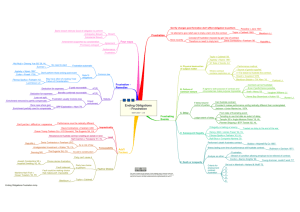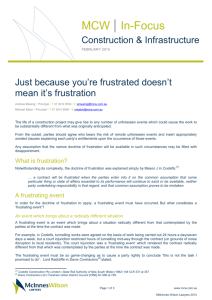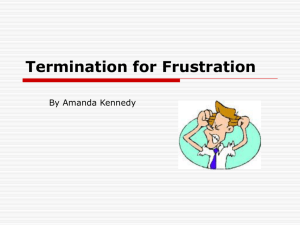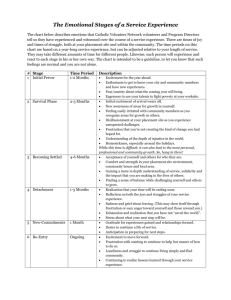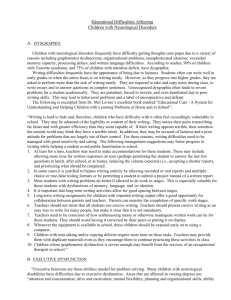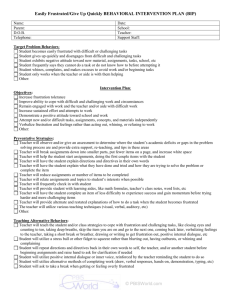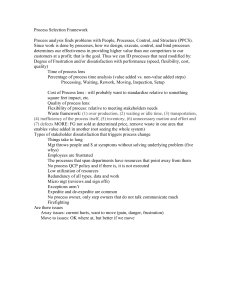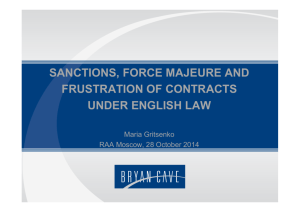Termination for Frustration
advertisement
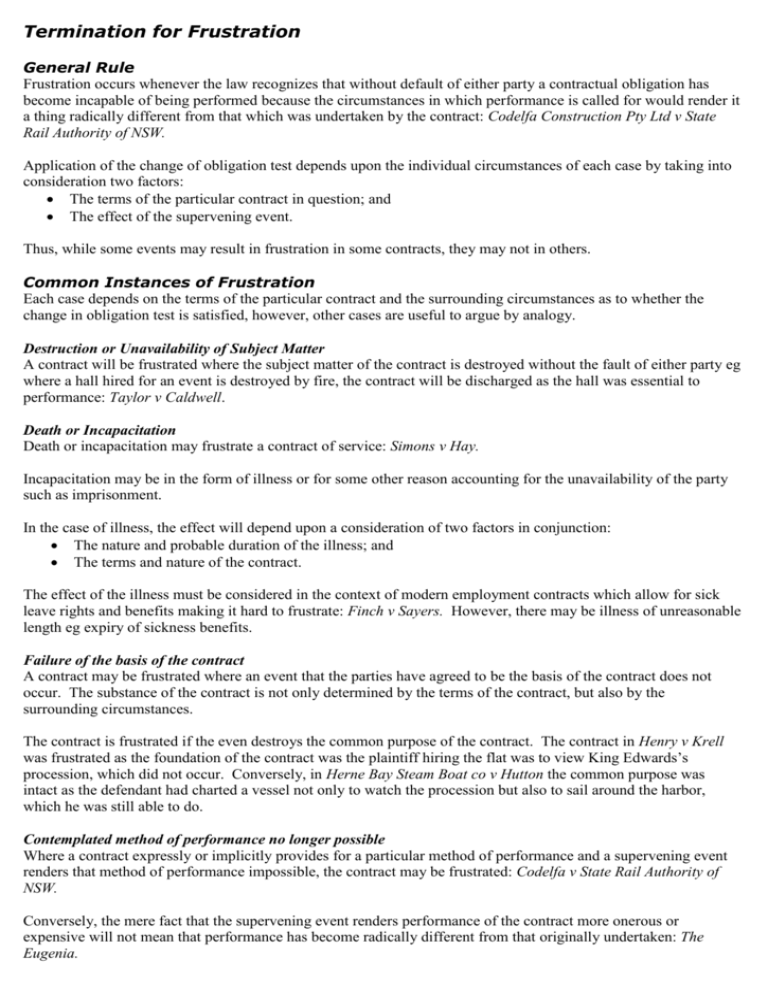
Termination for Frustration General Rule Frustration occurs whenever the law recognizes that without default of either party a contractual obligation has become incapable of being performed because the circumstances in which performance is called for would render it a thing radically different from that which was undertaken by the contract: Codelfa Construction Pty Ltd v State Rail Authority of NSW. Application of the change of obligation test depends upon the individual circumstances of each case by taking into consideration two factors: The terms of the particular contract in question; and The effect of the supervening event. Thus, while some events may result in frustration in some contracts, they may not in others. Common Instances of Frustration Each case depends on the terms of the particular contract and the surrounding circumstances as to whether the change in obligation test is satisfied, however, other cases are useful to argue by analogy. Destruction or Unavailability of Subject Matter A contract will be frustrated where the subject matter of the contract is destroyed without the fault of either party eg where a hall hired for an event is destroyed by fire, the contract will be discharged as the hall was essential to performance: Taylor v Caldwell. Death or Incapacitation Death or incapacitation may frustrate a contract of service: Simons v Hay. Incapacitation may be in the form of illness or for some other reason accounting for the unavailability of the party such as imprisonment. In the case of illness, the effect will depend upon a consideration of two factors in conjunction: The nature and probable duration of the illness; and The terms and nature of the contract. The effect of the illness must be considered in the context of modern employment contracts which allow for sick leave rights and benefits making it hard to frustrate: Finch v Sayers. However, there may be illness of unreasonable length eg expiry of sickness benefits. Failure of the basis of the contract A contract may be frustrated where an event that the parties have agreed to be the basis of the contract does not occur. The substance of the contract is not only determined by the terms of the contract, but also by the surrounding circumstances. The contract is frustrated if the even destroys the common purpose of the contract. The contract in Henry v Krell was frustrated as the foundation of the contract was the plaintiff hiring the flat was to view King Edwards’s procession, which did not occur. Conversely, in Herne Bay Steam Boat co v Hutton the common purpose was intact as the defendant had charted a vessel not only to watch the procession but also to sail around the harbor, which he was still able to do. Contemplated method of performance no longer possible Where a contract expressly or implicitly provides for a particular method of performance and a supervening event renders that method of performance impossible, the contract may be frustrated: Codelfa v State Rail Authority of NSW. Conversely, the mere fact that the supervening event renders performance of the contract more onerous or expensive will not mean that performance has become radically different from that originally undertaken: The Eugenia. In Codelfa the contract specifically stated that work on an underground railway would be carried out seven days a week which could not occur due to noise restrictions. Thus, performance of the contract was radically different that the parties had contemplated. Conversely, despite the Eugenia could not complete its journey on the expect route, the method of acceptance was not impossible as the contract did not state the vessel was to specifically travel via the Suez Canal which had been closed or the shortest possible carriage. Thus a 90 day extension was not radically different. Excessive Delay A delay in performance will render a contract frustrated depending on the probability of the length of the delay as compared to the time left to run on the contract: Jackson v Union Marine Insurance. The determination of whether the contract has been frustrated is for the tribunal of fact: Pioneer Shipping v BTP Tioxide. It is a question of weighing the commercial probabilities of delay in the light of the terms of the contract. The order which this is to be done has varied from contract to contract. In some cases, the determination was made at the time performance became impossible. In Bankline v Arthur Capel & Co a 12 month charter party was frustrated when the ship was requisitioned before the charter party commenced. Conversely, other parties have been expected to wait and see if the delay renders performance radically different: Pioneer Shipping. In Tamplin Steamship Co v Anglo MPP frustration did not occur when a five year time charter was requisitioned in its second year as there might have been many month during which the ship would be available for commercial purpose before the five years expired. Supervening Illegality A contract may be frustrated where at some time after formation, performance becomes illegal. Change in the Law Where the law changes and prohibits further performance of an existing contract, the contract will be frustrated: Cooper & Sons v Neilson & Maxwell. However, frustration will not occur if the change in legislation only limits the contract rather than preventing performance of the substance of the contract: Scanlan’s New Neon v Toohey. In Scanlan, while it was illegal to display an illuminated sign, the sign retained advertising value unilluminated. Contracting with the Enemy An executory contract (a contract which still has obligations to be performed) with an enemy country, or a contract which may benefit an enemy country or hinder the prosecution of war is frustrated from the day war is declared: Fibrosa v Fairbairn. Contracts Concerning Land Sale of Land A contract for the sale of land will be frustrated if the change in circumstances prevents the seller from being able to deliver title to the buyer at the nominated time eg where land has been resumed by the government: Austin v Sheldon A contract will not be frustrated if the sale of land includes a building, which is destroyed prior to settlement. The purchaser will still be able to acquire the title of the land and will have been taken to have taken the risk to damage to structures on the land: Fletcher v Manton. Leases of Land In Australia, the doctrine of frustration does not apply to leases: Firth v Halloran. However, support was given to the English position in Codelfa. In England, the interest granted by the lease or agreement to lease must no longer be capable of being enjoyed by the lessee to frustrate the contract. Mere destruction of the premises will not be sufficient however a ‘vast convulsion of nature that swallowed up the property altogether, or lost it to erosion of the sea may frustrate taking into account the following factors: The duration of the lease and the time left to run as at the time of the supervening event; The nature and object of the lease; and The length or prospective length of any interruption to the lessee’s possession. Limits on Frustration Express Contractual Provision If there is an express contractual provision dealing with the intervening event, the contract will not be frustrated: Claude Neon v Hardie. Clauses of the contract are to be read strictly. A wide term will be construed as applying only to those events contemplated by the parties thus events which radically change the nature of the contract are not foreseeable, and therefore will not be covered by the wide term: Metropolitan Water Board v Kerr. Supervening Event Foreseeable Where the supervening event was, or should have been, foreseen by the parties as a serious possibility, but for which the parties did not make express provision, the parties have nevertheless assumed the risk of the event occurring: Wj Tatem Ltd v Gamboa The rule does not apply where the parties have foreseen the supervening event, but its extent is greater than contemplated: Wj Tatem Ltd v Gamboa Supervening Event Induced by One of the Parties For frustration to apply, the supervening event must be without default of either party. Fault incorporates deliberate acts of a party which are intended to frustrate the contract: Maritime National Fish v Ocean Trawlers. The English courts have accepted fault includes negligence: The Super Servant Two. In order to determine frustration in regard to negligence, the degree of seriousness of the negligence (Josepth Constantine), the closeness of the cause or connection between the negligence and the frustrating event, whether the negligent conduct was directed towards performance of the contact, and the type of contract such as commercial or personal, will be relevant. Where a party enters into a number of contracts and has a real choice whether or not to fulfill one contract out of a number, the act or election leading to the failure to perform may be classified as self induced frustration: Maritime National Fish v Ocean Trawlers The onus of proving that frustration is self induced lies on the party who raises the allegation: Joseph Constantine Imperial Smelter Effect of Frustration Frustration automatically discharges the contract: Hirji Mulji v Cheong Yue Steamship. Both parties are relieved from further performance as from the time of frustration. Frustration does not void the contract ab initio. Unconditional rights and liabilities accrued prior to frustration remain unaffected by the discharge: Baltic Shipping v Dillan. However, rights or liabilities accrued prior to the frustrating event will be unenforceable if there has been a total failure of consideration eg money paid in deposit will be recoverable in restitution: Fibrosa Spolka Akcyjna v Fairbairn Lawson Combe Barbour. Where there has only been a partial failure of the consideration, there will be no right to recover any payment that has been made: Baltic Shipping v Dillan. Some clauses, eg arbitration, may continue to bind the parties even though performance is at an end: Codelfa. For a term to operate after the frustration, it must be clear the parties desired this result: BP Exploration v Hunt Services rendered after the contract has been discharged may be claimed on a quantum meruit basis: Codelfa.

